This article was first published in August 2019
by Helen Stroudley, Early Years Consultant
Is your child starting school soon? You might be wondering what you can do to prepare them over the summer to help them settle in. At school they’ll do lots of learning through play. Here are some fun activities you can do together that will boost your child’s learning in everyday life and get them ready for learning at school.
1. Going shopping
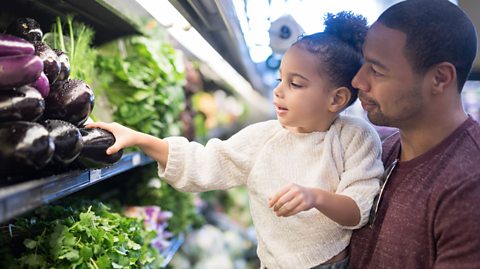
Shopping with young children can be challenging, but they can learn a lot – and be less bored - by being involved. Start by thinking aloud as you make your shopping list. This will help your child to listen carefully and to talk, both of which are building blocks for learning to read and write later on. You could encourage your child to choose a recipe and to ‘write’ their own list too. It will be mainly pictures and scribbles, but your praise will boost their confidence as a writer, and help them discover that there’s a reason for writing.
In the shop, ask your child to help find things from your list(s). This helps them to listen, concentrate and follow instructions – useful skills for school! They’ll also be practising their ‘reading’. At first they’ll recognise logos and packaging rather than letters and words, but this is another important step on the way to developing their literacy skills.
There’s a surprising amount of maths involved too. Your could ask your child to compare things of different size, weight and amounts, and they’ll hear you use everyday maths words at the same time. For example: “can you help count four apples into the bag?” or “Which feels heavier, the pasta or the rice?”
2. Playing outdoors
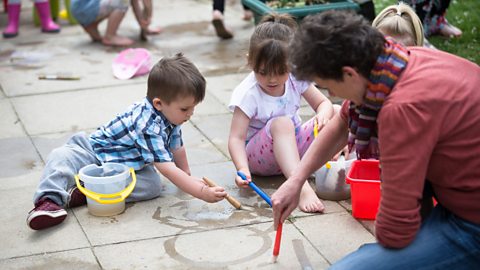 Image source, Peeple
Image source, PeepleSwinging, climbing, balancing or throwing and catching a ball at the playground all helps develop a child’s co-ordination and strength in their arms, legs and whole body (known as ‘gross motor skills’). This leads on to strengthening their hand and finger control (known as ‘fine motor skills’) which they’ll need for holding and controlling a crayon or pencil.
Building a castle is great for finger control – with sand and pebbles at the beach, with mud and stones outside the back door or in a park, or with play dough indoors. Try using a stick to make marks in the sand or dirt, or use a paintbrush and water to ‘paint’ on the pavement – more steps to early writing.
A playgrounds is a great place for children to go with or make friends. It extends the range of games they play and their conversations with other children. They develop their imaginations when they acting out stories they’ve heard , or inventing new worlds. And these interactions will mean that they’ll gradually learn to take turns and be more tolerant!
3. Sharing books and stories
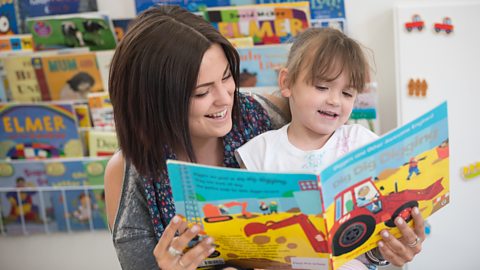 Image source, Peeple
Image source, PeepleChildren who enjoy books have a whole world opened up to them. It might be a wet, gloomy day but within seconds you can have escaped to a faraway place. Libraries have endless free fiction and non-fiction books for young children, and comfy places to sit and read.
Sharing a book or telling each other a story is a fantastic way to spend some spare time – including distracting a bored or tired child at home or in a queue. A snuggly bedtime story can become the highlight of a bedtime routine that helps settle your child to sleep. And remember, you don’t need to be a great reader, you can use a book as a prop and make up your own story.
Many young children have favourite books and stories which they ask for again and again. They enjoy hearing the familiar language, talking about favourite characters and finding things they recognise in the pictures. Stories that rhyme or have repeated phrases help children notice similar sounds, and also make it easier for them to join in.
4. Out and about
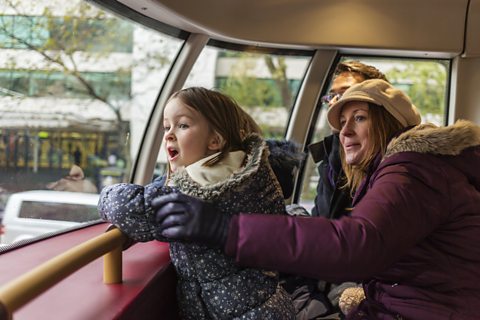
Make the most of getting from one place to another, whether by bus, car or on foot. Try playing a game of pointing out letters from your child’s name, on street signs, shop names, car number plates and bus tickets. Listening games are also helpful – e.g. “What sounds can you hear?” (motorbike, siren, bird, wind blowing etc). Always make it fun, not a test. Give clues or the answer in a positive way if they hesitate or get it ‘wrong’, so that they want to join in and keep playing.
Singing songs and rhymes support children’s language development too – as well as cheering up a bored or tired child. Lots of songs and rhymes also contain maths language, such as ‘Five in the Bed’. And you might like adding new verses to songs you know to go with chores that you are doing, or you could make up a story based on your child’s favourite story or character.
5. Chores = play
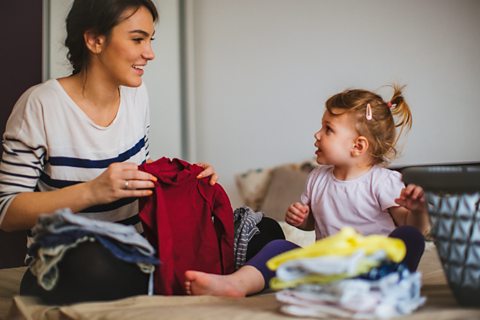
It’s a great idea to get your child to help with everyday jobs round the house. They might feel like a chore to you, but can be just another game for your child. They can pair socks as you sort the washing (counting, sorting, matching), or help to make a meal – weighing, mixing, counting out the cutlery and plates, hearing you think aloud about what else needs doing. Put on some music and dance around as you vacuum!
Younger children often look forward to things if their parents do. So if you enthuse your child about this new school adventure, that's how they'll see it. And keep adding to your building blocks of learning together - talking, listening, sharing books, singing and playing in day-to-day life!
You can find more ideas and resources on Starting Primary School.
Helen works for a charity called Peeple that supports parents and children to learn together.
This article was published in August 2019

More from BBC Bitesize Parents' Toolkit…
Parents' Toolkit
Fun activities, real-life stories, wellbeing support and loads of helpful advice - we're here for you and your child.
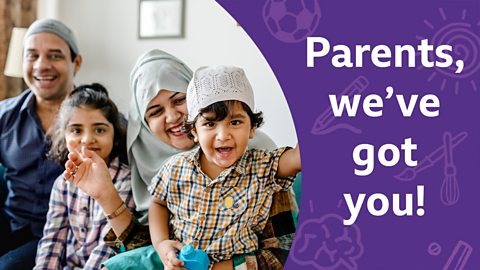
Seven skills a teenager can learn in one month
If your teen wants to shake up their free time, here are seven skills they can try.
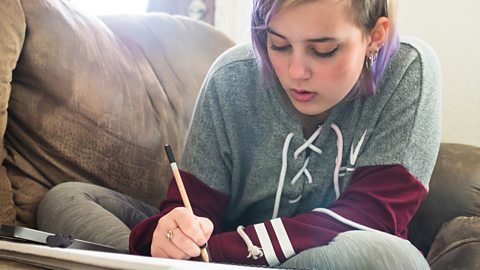
More Starting Primary School videos and articles
Head to our homepage to help you and your child prepare for starting primary school and thrive in school life.
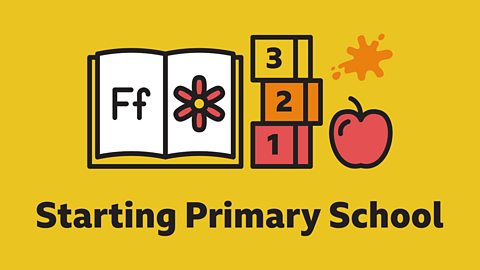
Easter Holidays Activity Pack activity
Check out some Easter inspired activities to complete in the Easter Holidays, for KS1.

Brummy Mummy's top tips for when your child is starting primary school
Emma, aka Brummy Mummy, gives her top tips for parents who have children starting primary school this September.
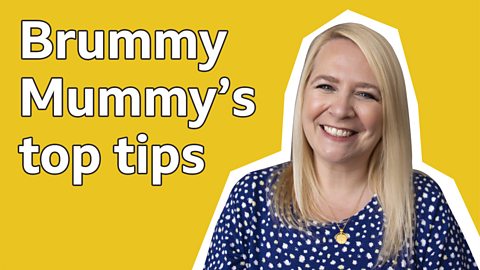
Bitesize Primary games. game
Play fun and educational primary games in science, maths, English, history, geography, art, computing and modern languages.
